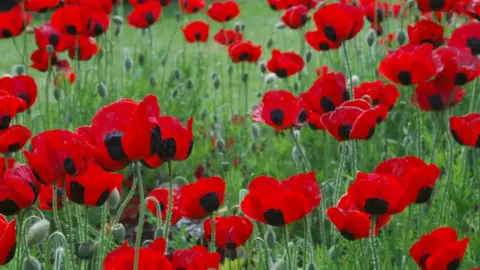Remembrance: The people thought about on Armistice Day
 BBC
BBCAs millions fell silent to mark Armistice Day, on Saturday and then Remembrance Sunday, some used social media platforms to tell stories personal to them.
These stories include a pair of Jewish women who parachuted into occupied Europe, a man who flew 22 missions in a Lancaster bomber, and the Scots who led troops from the trenches into the battlefields.
The stories came as the UK marked the 99th anniversary of the end of World War One.
The Scott Monument
Allow Instagram content?
'Beautiful' and 'amazing' were some of the comments left on this photo of the Remembrance Day memorial surrounding the Scott Monument in Edinburgh.
The Scott Monument is a monument to Scottish writer Sir Walter Scott, who lived from 1771-1832.
Scott is famous for writing classics such as Waverley, The Lady of the Lake and Ivanhoe.
The Armistice memorial is officially titled the 'Garden of Remembrance'.
The Plymouth Naval Memorial
Allow Instagram content?
Plymouth Hoe is home to the Plymouth Naval Memorial, which has been surrounded by poppies since August.
The memorial commemorates the men and women who lost their lives at sea in both World Wars.
The poppies that surround the memorial were originally on display at the Tower of London before being moved to Plymouth.
The poppies are designed to look like a wave emerging from the memorial, and will remain in Plymouth until 19 November.
The Battle of Passchendaele
Allow X content?
Former England rugby union flanker Lewis Moody was remembering his great uncle Ernest Lovejoy, who died in the Battle of Passchendaele.
This year marks the centenary of Passchendaele - a bloody World War One battle which was fought between 31 July and 6 November 1917.
The battle is not only infamous for the number of casualties - an estimated 585,000 - but for the mud. Many drowned in the thick quagmire, caused by weeks of relentless rain.
A ceremony was held in July this year to commemorate the dead.
The Lancaster Bomber
Allow X content?
Simon Edens, the chief constable of Northamptonshire police, shared images of former Northamptonshire police officers who joined HM Forces and died in the World Wars.
RAF Bomber Command, which flew the the WW11 bombers, suffered the highest loss rate of any major branch of the British armed forces, as some 55,000 crew members died in raids between 1939 and 1945.
The loss rate was so high that less than one crew in eight would survive fifty missions, and half of all aircrew died before they had completed ten missions.
The Jewish Parachutists
Allow X content?
On Twitter, Israeli Ambassador Mark Regev paid tribute to two Jewish women who volunteered to be parachuted into Nazi-occupied territories of Europe to help Jewish communities.
Born in Slovakia in 1914, Haiva Reik joined the Palmach - an elite Jewish commando force - and was later listed as one of the 32 or 33 parachutists sent by Britain's Special Operations Executive into occupied Europe. She was captured by the Nazis and subsequently executed in Slovakia in 1944, aged 30.
Hannah Szenes was born in Hungary in 1921. She joined Haganah - the underground Jewish military organisation which was the forerunner of the Israel Defense Forces (IDF) - and volunteered to be trained by the SOE in Egypt. Parachuted into Yugoslavia in 1944, she was arrested and tortured by Hungarian forces, and later executed by the Nazis.
The remains of both are buried in a military cemetery in Mount Herzl, Jerusalem.
The Scottish Pipers
Allow X content?
Todd Ferguson, a Scottish conservative councillor, commemorated pipers, tweeting that 1,000 of them lost their lives during the Great War.
The sound of bagpipes would lead troops from the trenches into the battlefield. However, pipers were easy targets for enemy forces.
The tradition was particularly strong in the Scottish Division.
During The Battle of Loos, Piper Daniel Laidlaw's rendition of Blue Bonnets Over the Border inspired the allied soldiers to go over the top after the gas released from a poison gas attack came back into the allied trenches.
By Tom Gerken, UGC and Social News team
